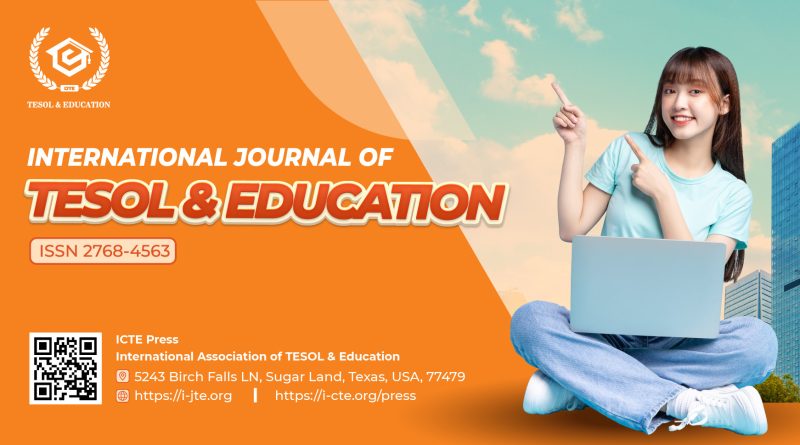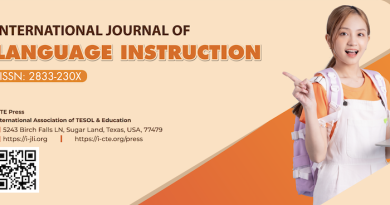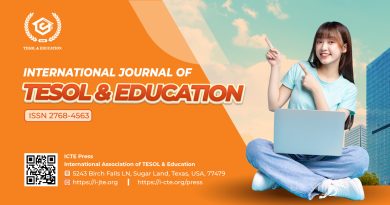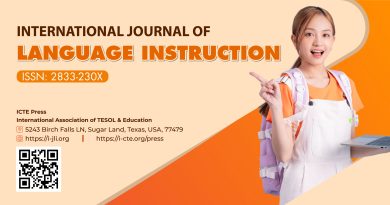Vol. 4 No. 4 (2024): TESOL & Education
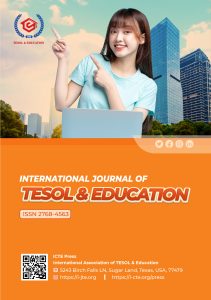 Dear TESOLers & Educators,
Dear TESOLers & Educators,
We are delighted to announce the successful completion and publication of Vol. 4, No. 4 (2024) of the International Journal of TESOL & Education.
In this issue, Le and Bui (2024) explore the professional identity construction of a pre-service EFL teacher through a narrative inquiry, focusing on personal, contextual, and social influences. The study examines the teacher’s identity before and during a practicum in Vietnam, using interviews and teaching diaries. Findings highlight adaptability, empathy, and reflective practice as keys to identity development. This work underscores the dynamic nature of teacher identity, offering valuable implications for teacher education programs to enhance practical, emotional, and ethical competencies in pre-service teachers.
Tran Quang Hai (2024) examines English causative constructions using construction grammar and radical construction grammar frameworks. Analyzing 310 samples from various sources, the study investigates the structural and semantic aspects of causative constructions. Findings highlight their role in depicting physical, emotional, and mental state changes. The research enhances understanding of causative structures and provides insights into their cognitive and linguistic applications, contributing to theoretical linguistics and practical usage in education and communication.
Pham and Nguyen (2024) investigated the use of translanguaging in Vietnamese EFL classrooms through a mixed-method study involving 183 university students. The findings reveal positive student perceptions of translanguaging as a tool to enhance learning, confidence, and communication. Challenges include lingering concerns about its implications for linguistic proficiency. The study highlights translanguaging as an innovative pedagogical approach, advocating for structured frameworks and teacher training to optimize its application in multilingual learning environments.
Nguyen (2024) investigates the role of silence in EFL classrooms, challenging the traditional view that equates silence with disengagement. Through a mixed-methods study of 132 engineering students, findings reveal that silence often reflects cognitive engagement, such as idea formulation and reflection. Factors like language anxiety and fear of peer judgment contribute to silence. Recommendations include fostering a supportive environment and redefining classroom participation to include silent engagement. This research emphasizes the importance of nuanced interpretations of silence in educational contexts.
Céleste and Nsirim (2024) investigate English language anxiety among Francophone students in Cameroon studying Spanish and English at the University of Yaoundé I. Using mixed methods, they identify linguistic typology, limited input, and negative reactions as primary anxiety sources. Findings highlight the impact of anxiety on motivation, self-esteem, and learning behavior. The study recommends fostering positive attitudes, incorporating digital tools, and increasing English language exposure to alleviate anxiety and enhance language acquisition. This research provides actionable insights into the challenges of multilingual education in diverse sociolinguistic contexts.
Akter (2024) critically examines the Medium of Instruction (MoI) policies and practices in Bangladesh from primary to higher secondary education. Using a systematic literature review, the study reveals inconsistencies between policy and practice, with Bangla as the de jure language and English emerging as the de facto language. These disparities contribute to social, economic, and cultural inequalities, including linguistic barriers for ethnic minorities and economic advantages for English-medium students. The article emphasizes the need for inclusive MoI policies and improved English education to bridge these gaps, offering insights for policymakers and sociolinguists.
Sari (2024) investigates the use of AI language models for democratizing IELTS preparation, focusing on essay scoring accuracy compared to human examiners. Analyzing four tools—ChatGPT, Google Bard, Writing9.com, and Upscore.ai—findings reveal Upscore.ai as the most accurate, with a mean absolute error (MAE) of 0.5. While AI tools offer accessibility and cost benefits, they lack nuanced evaluation, underscoring the need for human oversight. The study highlights AI’s potential for affordable, scalable test preparation but emphasizes integrating AI with human feedback for comprehensive assessments.
Le (2024) conducts a contrastive analysis of similes with “dog” imagery in English and Vietnamese, exploring cultural and linguistic differences using Hofstede’s Cultural Dimensions Theory. Analyzing 21 similes from both languages, the study finds that English similes carry both positive (38%) and negative (62%) connotations, while Vietnamese similes are entirely negative (100%). This disparity reflects differing cultural attitudes toward dogs—companions in English culture and less positively viewed in Vietnamese traditions. The findings inform cross-cultural communication, language teaching, and translation practices.
This milestone would not have been possible without the exceptional efforts of our dedicated authors, the meticulous reviewers, and the tireless editorial staff. Their collective commitment and expertise have significantly contributed to the high quality and scholarly excellence of this issue.
- Authors: Thank you for your valuable contributions and for advancing the field of TESOL and education through your insightful research.
- Reviewers: We appreciate your thorough evaluations and constructive feedback, which have been instrumental in maintaining the integrity and rigor of our journal.
- Editorial Staff: Your unwavering support and efficient management have ensured the smooth production and dissemination of this issue.
We invite you to explore the latest research and discussions featured in this edition. Access the issue directly through the following DOI link: https://doi.org/10.54855/ijte.2444
Thank you for your continued support and dedication to the International Journal of TESOL & Education. We look forward to bringing you more exceptional content in the future.
Thanks be to God for everything!
Warm regards,
Associate Professor Dr. Pham Vu Phi Ho
Editor-in-chief
International Journal of TESOL & Education
Full Issue
Research Article
From Imagination to Practice: Unravelling the Professional Identity of a Pre-service EFL Teacher
DOI: https://doi.org/10.54855/ijte.24441
Le Khanh Linh, Bui Le Diem Trang
1-34
Analysis of State Changes in English Causative Constructions: Insights from Construction Grammar
DOI: https://doi.org/10.54855/ijte.24442
Tran Quang Hai
35-53
Translanguaging in EFL Classrooms: Practice and Implications for Lecturers from Students’ Lens
DOI: https://doi.org/10.54855/ijte.24443
Pham Huong Ngoc Uyen, Nguyen Trang Dung
54-68
Students’ Silence – Redefining What It Means to Participate in EFL Classrooms
DOI: https://doi.org/10.54855/ijte.24444
Nguyen Trang Dung
69-80
English Language Anxiety in Higher Education: A Case Study of Spanish Students
DOI: https://doi.org/10.54855/ijte.24445
Sokeng Piewo Stéphane Céleste, Manfred Njolaï Nsirim
81-96
DOI: https://doi.org/10.54855/ijte.24447
Amalia Novita Sari
111-126
Contrastive Analysis of Similes with Dog Image in English and Vietnamese and Implications
DOI: https://doi.org/10.54855/ijte.24448
Le Hoai Thu
127-147
Literature Review
Medium of Instruction: The Context of Primary, Secondary and Higher Secondary Level in Bangladesh
DOI: https://doi.org/10.54855/ijte.24446
Moumita Akter
97-110

